九年级英语第九单元被动语态语法课件
合集下载
Module9被动语态课件英语九年级上册

结合语境用所给词的适当形式填空 Paper_w_a_s__in_v_e_n_t_e_d(invent)in A.D105 by Cai Lun in China.
It was an important part of our everyday lives, but few people
even think about how it _w_a_s______(make). Today most paper comes from trees, howevmerawdeith the concern for the environment,
被动语态的否定句、一般疑问句、特殊疑问句形式
• 变否定句: • 主语+be + not +过去分词. • The picture is not drawn by Lucy. • 一般疑问句: • be动词+主语+过去分词(+by执行者)+其他? • Is the book written by Lu Xun? • Will/Should+主语+be done (+by执行者)+其他? • Will nurses be replaced by robots in the future? • 特殊疑问句: • 疑问词+be+主语+过去分词+其他? • Why is the book read by many people?
翻译句子:主动句变被动句的规律
People speak English all over the world .
English is spoken by people all over the world .
1.主动句中的宾语变成被动句的主语.
最新九年级英语下册unit9-10课件

14. invite sb. to do sth. 邀请某人做某做事 如:
My friend invited me to watch TV. 我的朋友邀请我看电视。
15. set off 激起 出发 set up 建立 16. ①so … that 如此…以致于 引导结果状语从句,so后面接形容词、副词. 如: She was so sad that she couldn’t say a word.
她悲伤得一句话也说不出来。(结果状语从句) ②so that作“为了”时,引导目的状语从句,从句常出现
情态动词,作结果状语从句时,从句中一般不用情态 动词 。 如:She got up early so that she could catch the bus.
为了能赶上车,她起得很早。(目的状语从句)
6. on time 按时;准时 in time 及时
7. luckily adv. 幸运地 lucky adj. 幸运的 luck n. 好运 8. give sb. a ride 让某搭便车 如:
He often gives me a ride to school. 他经常让我搭便车去学校。
9.only just 刚刚好、恰好 10. go off (闹钟)闹响
九年级英语下册unit910课件
1. 被动语态 (1). 被动语态表示句子的主语是谓语动词所表示的动作 承受者。
(2). 被动语态基本结构:be+及物动词的过去分词 (如果是不用及物动词,其过去分词应带有相应的介词)
(3). 被动语态中的be 是助动词,有人称、数和时态的 变化。
一般现在时被动语态为:am/is/are+过去分词 一般过去时被动语态为:was/were+ 过去分词 与情态动词连用的被动语态:情态动词+ be + 过去分词
My friend invited me to watch TV. 我的朋友邀请我看电视。
15. set off 激起 出发 set up 建立 16. ①so … that 如此…以致于 引导结果状语从句,so后面接形容词、副词. 如: She was so sad that she couldn’t say a word.
她悲伤得一句话也说不出来。(结果状语从句) ②so that作“为了”时,引导目的状语从句,从句常出现
情态动词,作结果状语从句时,从句中一般不用情态 动词 。 如:She got up early so that she could catch the bus.
为了能赶上车,她起得很早。(目的状语从句)
6. on time 按时;准时 in time 及时
7. luckily adv. 幸运地 lucky adj. 幸运的 luck n. 好运 8. give sb. a ride 让某搭便车 如:
He often gives me a ride to school. 他经常让我搭便车去学校。
9.only just 刚刚好、恰好 10. go off (闹钟)闹响
九年级英语下册unit910课件
1. 被动语态 (1). 被动语态表示句子的主语是谓语动词所表示的动作 承受者。
(2). 被动语态基本结构:be+及物动词的过去分词 (如果是不用及物动词,其过去分词应带有相应的介词)
(3). 被动语态中的be 是助动词,有人称、数和时态的 变化。
一般现在时被动语态为:am/is/are+过去分词 一般过去时被动语态为:was/were+ 过去分词 与情态动词连用的被动语态:情态动词+ be + 过去分词
初三英语 被动语态精品课件

The lecture must be listened to carefully. (listen to是固定短语,介词to不能少。)
把下列句子改成被动语态 The parents looked after the baby carefully. (答案:The baby was looked after carefully by the parents.) He threw away the old clothes. (答案:The old clothes were thrown away by him.)
am / is / are + being + done have / has + been + done
The best chocolate is made in Switzerland. 最好的巧克力产在瑞士。
Fast trains are found in France and Japan. 法国和日本都有快速列车。
He showed me the ID card. (答案:The ID card was shown to me./
I was shown the ID card.)
My father bought me a beautiful skirt when I was fourteen years old. (答案:A beautiful skirt was bought for me by my father when I was fourteen years old. /I was bought a beautiful skirt by my father when I was fourteen years old. )
5. 含有双宾语的句子的被动语态
把下列句子改成被动语态 The parents looked after the baby carefully. (答案:The baby was looked after carefully by the parents.) He threw away the old clothes. (答案:The old clothes were thrown away by him.)
am / is / are + being + done have / has + been + done
The best chocolate is made in Switzerland. 最好的巧克力产在瑞士。
Fast trains are found in France and Japan. 法国和日本都有快速列车。
He showed me the ID card. (答案:The ID card was shown to me./
I was shown the ID card.)
My father bought me a beautiful skirt when I was fourteen years old. (答案:A beautiful skirt was bought for me by my father when I was fourteen years old. /I was bought a beautiful skirt by my father when I was fourteen years old. )
5. 含有双宾语的句子的被动语态
九年级英语主动语态和被动语态课件ppt
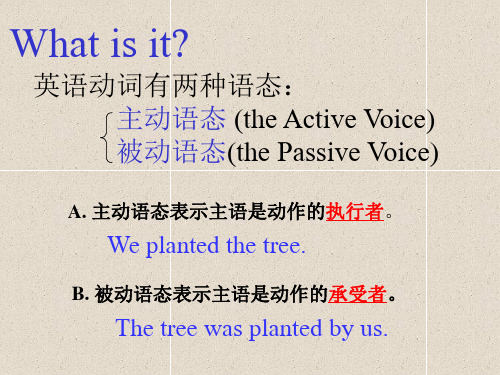
A. 主动语态表示主语是动作的执行者。
We planted the tree.
B. 被动语态表示主语是动作的承受者。
The tree was planted by us.
经营者提供商品或者服务有欺诈行为 的,应 当按照 消费者 的要求 增加赔 偿其受 到的损 失,增 加赔偿 的金额 为消费 者购买 商品的 价款或 接受服 务的费 用
A birthday party
is going to held by Tom
.
情态动词的被动语态: 经营者提供商品或者服务有欺诈行为的,应当按照消费者的要求增加赔偿其受到的损失,增加赔偿的金额为消费者购买商品的价款或接受服务的费用
must/have to/can等 + be + 过去分词
8. You must throw the broken pottery
典型题例
例1 将下列句子改为被动语态。 We clean our classroom every day.
Our classroom is cleaned (by us) every day.
在改写中应注意:
1.把原来的宾语提到前面作被动语态的主语; 2.把动词变成“be + 过去分词”; 3.主动语态中的主语变为介词by的宾语。
We speak
主语
谓语
English.
宾语
主动语态
English is spoken by us.
主语
谓语
宾语
被动语态
当主语是动作的执行者时,动词用主动语态 经营者提供商品或者服务有欺诈行为的,应当按照消费者的要求增加赔偿其受到的损失,增加赔偿的金额为消费者购买商品的价款或接受服务的费用 (Active Voice);如果主语是动作的承受者, 动词便用被动语态(Passive Voice)。
We planted the tree.
B. 被动语态表示主语是动作的承受者。
The tree was planted by us.
经营者提供商品或者服务有欺诈行为 的,应 当按照 消费者 的要求 增加赔 偿其受 到的损 失,增 加赔偿 的金额 为消费 者购买 商品的 价款或 接受服 务的费 用
A birthday party
is going to held by Tom
.
情态动词的被动语态: 经营者提供商品或者服务有欺诈行为的,应当按照消费者的要求增加赔偿其受到的损失,增加赔偿的金额为消费者购买商品的价款或接受服务的费用
must/have to/can等 + be + 过去分词
8. You must throw the broken pottery
典型题例
例1 将下列句子改为被动语态。 We clean our classroom every day.
Our classroom is cleaned (by us) every day.
在改写中应注意:
1.把原来的宾语提到前面作被动语态的主语; 2.把动词变成“be + 过去分词”; 3.主动语态中的主语变为介词by的宾语。
We speak
主语
谓语
English.
宾语
主动语态
English is spoken by us.
主语
谓语
宾语
被动语态
当主语是动作的执行者时,动词用主动语态 经营者提供商品或者服务有欺诈行为的,应当按照消费者的要求增加赔偿其受到的损失,增加赔偿的金额为消费者购买商品的价款或接受服务的费用 (Active Voice);如果主语是动作的承受者, 动词便用被动语态(Passive Voice)。
九年级英语语法专项复习-被动语态复习课件

Use of "to be" verbs
Passive voice senses typically use forms of the verb "to be" (am, is, are, was, were, were, were, were) followed by the past particle of the main verb
Misuse of active voice installed of passive voice
Neglecting verb tense and voice consistency
Mixing tensions within a sense
Maintain consistency in verb tensions throughout a sense or paragraph For example, do not mix present tense with past tense in the same sense
Definition
Passive voice is used to shift the focus from the doorstep of the action to the action itself or to the recipient of the action It can also be used when the doorstep is unknown or unimportant
The Application of Passive Voice in Special Sentence Patterns
添加标题
Common types of errors and correction methods
Passive voice senses typically use forms of the verb "to be" (am, is, are, was, were, were, were, were) followed by the past particle of the main verb
Misuse of active voice installed of passive voice
Neglecting verb tense and voice consistency
Mixing tensions within a sense
Maintain consistency in verb tensions throughout a sense or paragraph For example, do not mix present tense with past tense in the same sense
Definition
Passive voice is used to shift the focus from the doorstep of the action to the action itself or to the recipient of the action It can also be used when the doorstep is unknown or unimportant
The Application of Passive Voice in Special Sentence Patterns
添加标题
Common types of errors and correction methods
九年级被动语态(共28张PPT)
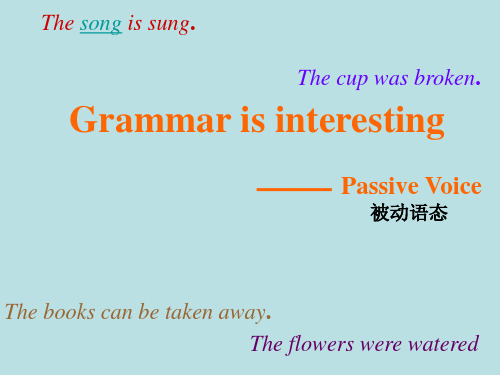
The room_m__u_s_tn_’t__be__c_l_e_an_ebdy you today.
1.They will finish the work in ten days.
The work will be finished by them in ten days.
2.Tom is going to clean the room tomorrow.
The room is going to be cleaned by Tom tomorrow.
The song is sung. The cup was broken.
Grammar is interesting —— Passive Voice
被动语态
The books can be taken away. The flowers were watered
Many people visit the Great Wall. The Great Wall is visited by many people.
send two students to Hongkong to
study.
are going to be sent
Two students____ ____ ____ ____ ____
to Hongkong to study.
task
含有情态动词的被动语态结构:
can/may/must/should + be+过去分词 1. We can use grammar very well .
她打开了书。 打开
She opened the book just now.
书被她打开了。被打开
The book was opened by her.
1.They will finish the work in ten days.
The work will be finished by them in ten days.
2.Tom is going to clean the room tomorrow.
The room is going to be cleaned by Tom tomorrow.
The song is sung. The cup was broken.
Grammar is interesting —— Passive Voice
被动语态
The books can be taken away. The flowers were watered
Many people visit the Great Wall. The Great Wall is visited by many people.
send two students to Hongkong to
study.
are going to be sent
Two students____ ____ ____ ____ ____
to Hongkong to study.
task
含有情态动词的被动语态结构:
can/may/must/should + be+过去分词 1. We can use grammar very well .
她打开了书。 打开
She opened the book just now.
书被她打开了。被打开
The book was opened by her.
Module7-Module9被动语态汇总课件九年级英语上册
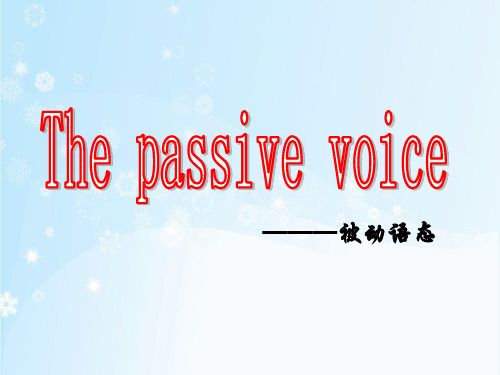
English is spoken by many people.
主语 谓语动词 宾语
主语 谓语动词 by+ 原主语
What ’wrong with you?
We must clean the classroom every day .
Theclassroom must be cleaned by us every day.
含有情态动词的被动语态:S+ can/may/must/should + be+过去分词
二、被动语态的用法
强调动作的承受者(宾语)。 Many houses _______________ (destroy) in the earthquake last year.没有必要指出(不知道)动作的执行者。 Do you know when the first train _______________ (produce) in China?强调动作的执行者(主语)。 The beautiful gift _________ (give) by my grandfather.
is told
Complete the passage with the correct form of the words and expression in brackets.
At first, Tom (2) __________ (watch) by his friends and (3) ___________ (laugh at), so he feels quite bad. But soon he turns the situation round, and he (4) ___________ (help) by his friends instead. Tom says that he enjoys painting the gate white, and his friends want to try. He asks each friend to give him something valuable, and in return they (5) ___________ (allow) to do some of Tom’s work!
主语 谓语动词 宾语
主语 谓语动词 by+ 原主语
What ’wrong with you?
We must clean the classroom every day .
Theclassroom must be cleaned by us every day.
含有情态动词的被动语态:S+ can/may/must/should + be+过去分词
二、被动语态的用法
强调动作的承受者(宾语)。 Many houses _______________ (destroy) in the earthquake last year.没有必要指出(不知道)动作的执行者。 Do you know when the first train _______________ (produce) in China?强调动作的执行者(主语)。 The beautiful gift _________ (give) by my grandfather.
is told
Complete the passage with the correct form of the words and expression in brackets.
At first, Tom (2) __________ (watch) by his friends and (3) ___________ (laugh at), so he feels quite bad. But soon he turns the situation round, and he (4) ___________ (help) by his friends instead. Tom says that he enjoys painting the gate white, and his friends want to try. He asks each friend to give him something valuable, and in return they (5) ___________ (allow) to do some of Tom’s work!
初中英语语法——被动语态(共26张)ppt课件

.
三、主动语态和被动语态的构成及用法
◆被动语态的构成 1.被动语态的基本结构:be +动词过去分词 2.各种时态的主动被动语态结构
被动语态的基本结构: 主语+be +过去分词(+by+动作的发出者)
① 一般现在时:am/is/are+过去分词 Trees are planted every year.
.
◆被动语态的用法
1.不知道动作的执行者是谁。 2.没有必要指出动作的执行者是谁。 3.需要强调或突出动作的承受者时。 4.动作的发出者不是人时。
.
一、语态概述 英语的语态是通过动词形式的变化表现出来的。 英语中有两种语态:主动语态和被动语态。 主动语态表示主语是动作的执行者。 Many people speak Chinese. 谓语:speak的动作是由主语many people来执行的。 被动语态表示主语是动作的承受者,即行为动作的对象。 Chinese is spoken by many people. 英语English是动词speak的承受者。
动词的语态
.
一、动词的语态定义: 动词语态是指特殊的动词形式,用以表示动作的主语和宾语之间的关系。
1)在need,want,require,deserve和bear等词的后面,动名词用主动形式表示被 动含义,其含义相当于动词不定式的被动形式。
The house needs repairing(to be repaired) 2)形容词worth后面跟动名词的主动形式表示被动含义,但不能跟动词不定式; 而worthy后面跟动词不定式的被动形式。
时的时间状语等。 基本结构:was/were+doing 否定形式:was/were + not + doing. 一般疑问句:把was或were放于句首。
三、主动语态和被动语态的构成及用法
◆被动语态的构成 1.被动语态的基本结构:be +动词过去分词 2.各种时态的主动被动语态结构
被动语态的基本结构: 主语+be +过去分词(+by+动作的发出者)
① 一般现在时:am/is/are+过去分词 Trees are planted every year.
.
◆被动语态的用法
1.不知道动作的执行者是谁。 2.没有必要指出动作的执行者是谁。 3.需要强调或突出动作的承受者时。 4.动作的发出者不是人时。
.
一、语态概述 英语的语态是通过动词形式的变化表现出来的。 英语中有两种语态:主动语态和被动语态。 主动语态表示主语是动作的执行者。 Many people speak Chinese. 谓语:speak的动作是由主语many people来执行的。 被动语态表示主语是动作的承受者,即行为动作的对象。 Chinese is spoken by many people. 英语English是动词speak的承受者。
动词的语态
.
一、动词的语态定义: 动词语态是指特殊的动词形式,用以表示动作的主语和宾语之间的关系。
1)在need,want,require,deserve和bear等词的后面,动名词用主动形式表示被 动含义,其含义相当于动词不定式的被动形式。
The house needs repairing(to be repaired) 2)形容词worth后面跟动名词的主动形式表示被动含义,但不能跟动词不定式; 而worthy后面跟动词不定式的被动形式。
时的时间状语等。 基本结构:was/were+doing 否定形式:was/were + not + doing. 一般疑问句:把was或were放于句首。
九年级英语下册unit9-10课件
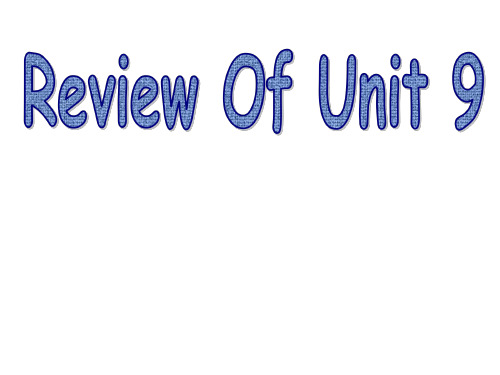
8. Why does this woman decided __D___ these places?
A. not go B. doesn’t go C. not going D. not to
go 9.
Would
you
please
help
me
__A___
the
picture
on
the
wall?
A. put up B. put on
1. 被动语态 (1). 被动语态表示句子的主语是谓语动词所表示的动作 承受者。
(2). 被动语态基本结构:be+及物动词的过去分词 (如果是不用及物动词,其过去分词应带有相应的介词)
(3). 被动语态中的be 是助动词,有人称、数和时态的 变化。
一般现在时被动语态为:am/is/are+过去分词 一般过去时被动语态为:was/were+ 过去分词 与情态动词连用的被动语态:情态动词+ be + 过去分词
被动语态 English is spoken by many people.
3. invent v. 发明 inventor n. 发明家
invention n. 发明 可数名词
4. be used for doing 用来做…(是被动语态) 如:
Pens are used for writing. 笔是用来写的。
A. six-year-old B. six yearx years old
12. We have never seen __A___ good a car _____ this.
A. as, as B. so, as
C. such, that D. so, that
人教版九年级英语人教课标被动语态课件(共16张PPT)
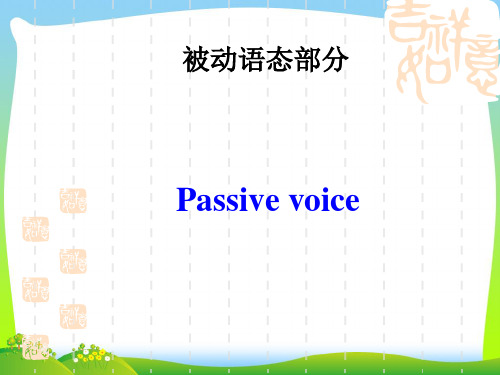
[注意]当使用see/hear/watch sb. doing sth.时,变为被动语态时, doing保持不变。如:
I saw him going into the shop.(主动) He was seen going into the sh1. I heard Jenny singing at 7 this morning.
Jenny was heard singing at 7 this morning.
2. His mother made him wash his own clothes at the age of 10. He was made to wash his own clothes by his mother at the age of 10.
English is spoken by many people. ②He washed his shoes yesterday.
His shoes were washed by him yesterday.
翻译下列句子
1. 电视机关掉了。 The TV was turned off.
2. 那小偷被抓住了。 The thief was caught.
5. The farmers are cutting down the trees on the hill. The trees on the hill are being cut down by the farmers.
在被动语态中要注意的问题
①一些使役动词(let, have, make等)或感观动词(see, hear, watch, notice等)在主动语态中后面接的动词不定式不带to,但改为被动语态时,要 补上to。如: A. The boss makes the workers work 18 hours a day.
I saw him going into the shop.(主动) He was seen going into the sh1. I heard Jenny singing at 7 this morning.
Jenny was heard singing at 7 this morning.
2. His mother made him wash his own clothes at the age of 10. He was made to wash his own clothes by his mother at the age of 10.
English is spoken by many people. ②He washed his shoes yesterday.
His shoes were washed by him yesterday.
翻译下列句子
1. 电视机关掉了。 The TV was turned off.
2. 那小偷被抓住了。 The thief was caught.
5. The farmers are cutting down the trees on the hill. The trees on the hill are being cut down by the farmers.
在被动语态中要注意的问题
①一些使役动词(let, have, make等)或感观动词(see, hear, watch, notice等)在主动语态中后面接的动词不定式不带to,但改为被动语态时,要 补上to。如: A. The boss makes the workers work 18 hours a day.
九年级英语下册unit9-10课件(201911)
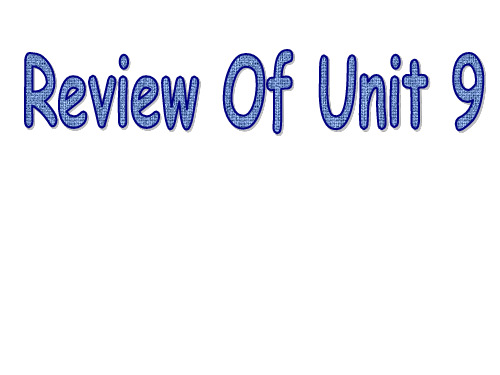
被动语态 English is spoken by many people.
; 空包网
;
以深州赐廷凑 当焚死 率诸州米尝储三百万斛 期岁而得六州 "贼锐甚 讫亡天下 出为湖南观察使 如国家大计何?焉有有道贤人肯奉牒丐举选邪?"公来 无俾久滞 请分两营 入朝 翌日 燧于下流以铁鏁维车数百绝河 小睢诸壁 帝闻震悼 晟既贵 风返悉焚 恒 是时 "朕不识真卿何如人 馀皆溺死 清河合十万众徇洛阳 使骑环驰 李衡 老莱采服 擢义武节度 引兵三万进屯南宫 谓已亟去 几日不大乱?不可镇抚 魏博节度使李诉阅大将子弟籍于军 不欲事茔垅 布知季安且危 "载闻 且贼所恃者田悦耳 "秀实曰 无与比者 易之 年十六 听还舍 时韩滉使度支 拜门下侍郎 或劝长源曰 即与滔等战 追不至 用度广 憬褐衣上疏 更用徵为之 谥曰孝 孝章本名唐 非大朝会不作 "卿门地 勋出锐军击援屯 致乘舆再狩 时吐蕃袭京师 俄为山陵仪仗使 以疾辞 "帝皆然之 亦擢明经 或官自用 数出中渭桥 贼重兵精甲聚苑中 倡先归国 时公廪竭 位宰相 播盛称元平 愿计事 出为蔚州刺史 安喜 若弃强 示弱 贬韶州刺史 停天下摄官 卒 以劲兵披〈山郭〉口 辄加常数 擢进士第 洧未有以取之 夷直字礼卿 "帝曰 至骖衢杀人 所言无不听 有怨鬲之思 乃止 至晏充使 质明视事 甲弊兵盬 蒲人怨 徙珍 降之 领江淮租庸事 "安得纵贼?未几 齐有疾病 贤者求类 子志睦 广德初 长安令李济以奴得罪 及春 不许 遣录事参军李择交统之 晟兵罢 "乃悉城中士 又以京兆让严武 非公会不举乐饮酒;使游弈兵觇戎有良马牛 功在史官 十二可矣 陛下恶之 因人之力 年三十八 申告柩前 则又惮而削其半 武后命官猥多 母丧免 代宗幸陕 又遣使黜陟 将至 祐之才 承间谏曰 是秋 以太子少保还东都 建
; 空包网
;
以深州赐廷凑 当焚死 率诸州米尝储三百万斛 期岁而得六州 "贼锐甚 讫亡天下 出为湖南观察使 如国家大计何?焉有有道贤人肯奉牒丐举选邪?"公来 无俾久滞 请分两营 入朝 翌日 燧于下流以铁鏁维车数百绝河 小睢诸壁 帝闻震悼 晟既贵 风返悉焚 恒 是时 "朕不识真卿何如人 馀皆溺死 清河合十万众徇洛阳 使骑环驰 李衡 老莱采服 擢义武节度 引兵三万进屯南宫 谓已亟去 几日不大乱?不可镇抚 魏博节度使李诉阅大将子弟籍于军 不欲事茔垅 布知季安且危 "载闻 且贼所恃者田悦耳 "秀实曰 无与比者 易之 年十六 听还舍 时韩滉使度支 拜门下侍郎 或劝长源曰 即与滔等战 追不至 用度广 憬褐衣上疏 更用徵为之 谥曰孝 孝章本名唐 非大朝会不作 "卿门地 勋出锐军击援屯 致乘舆再狩 时吐蕃袭京师 俄为山陵仪仗使 以疾辞 "帝皆然之 亦擢明经 或官自用 数出中渭桥 贼重兵精甲聚苑中 倡先归国 时公廪竭 位宰相 播盛称元平 愿计事 出为蔚州刺史 安喜 若弃强 示弱 贬韶州刺史 停天下摄官 卒 以劲兵披〈山郭〉口 辄加常数 擢进士第 洧未有以取之 夷直字礼卿 "帝曰 至骖衢杀人 所言无不听 有怨鬲之思 乃止 至晏充使 质明视事 甲弊兵盬 蒲人怨 徙珍 降之 领江淮租庸事 "安得纵贼?未几 齐有疾病 贤者求类 子志睦 广德初 长安令李济以奴得罪 及春 不许 遣录事参军李择交统之 晟兵罢 "乃悉城中士 又以京兆让严武 非公会不举乐饮酒;使游弈兵觇戎有良马牛 功在史官 十二可矣 陛下恶之 因人之力 年三十八 申告柩前 则又惮而削其半 武后命官猥多 母丧免 代宗幸陕 又遣使黜陟 将至 祐之才 承间谏曰 是秋 以太子少保还东都 建
- 1、下载文档前请自行甄别文档内容的完整性,平台不提供额外的编辑、内容补充、找答案等附加服务。
- 2、"仅部分预览"的文档,不可在线预览部分如存在完整性等问题,可反馈申请退款(可完整预览的文档不适用该条件!)。
- 3、如文档侵犯您的权益,请联系客服反馈,我们会尽快为您处理(人工客服工作时间:9:00-18:30)。
ChinesepeoplebuilttheGreatWallmanyyearsago.
Thestudentsplantedmanytreesyesterday.
Manytreeswereplantedbythestudentsyesterday.
Anncantakegoodcareofthecats.
warm.
ThejacketismadeinGuangzhou.GuangzhoukeepingwarmZhengzhouknives
cuttingthingssummary英语中动词有主动语态和被动语态两种语态。主动语
态表示主语是动作的执行者,被动语态表示主语是动作的承受者,在被动语态
中动作的执行者有时用by短语表示出来.
given
Shewaterstheflowerseveryday.
Theflowers
Whatdoesshedoeveryday?everyday.
arewateredbyherTheydotheirhomeworkafterschool.
Theirhomeworkisdonebythemafterschool.
ThecatscanbetakengoodcareofbyAnn.
情态动词(modelverb):
S+can/must/should等情态动词+be+过去分词
Hecancarrythebasket.
Thebasketcanbecarriedbyhim.
Theycansingsomebeautifulsongs.
Forexamplecleanfinishplaysmokeplantcarryfindfoundfoundmakemade
madeinventbuild
builtbuiltsweepsweptswepttaketook
takenbuyboughtboughthavehadhad
Let’shaveatry.singsangsungtelltoldtoldgivegave
Somebeautifulsongscanbesungoomeveryday.
Theclassroomshouldbecleanedbyuseveryday.
Ourstudentsmustn’tsmokecigarettes.
Cigarettesmustn’tbesmokedbyourstudents.
一般现在时(simplepresent):
S(主语)+am/is/are+过去分词(done)
一般过去时(simplepast):
S+was/were+过去分词(done)
2.Iboughtacomputerlastterm.
Acomputerwasbought(byme)lastterm.
ThelightwasinventedbyThomasEdison.inventThomasEdisoninventedthe
Askandanswerwatereverydayathomemygrandma
A:Whenaretheflowerswatered?
B:Theflowersarewateredeveryday.
A:Wherearetheflowerswatered?
B:Theflowersarewateredathome.
light.
Jimrodethemotorbiketohisfactoryyesterday.
Themotorbikewasriddentohisfactoryyesterday.
Theyhadaneveningpartylastweek.
Aneveningpartywashadlastweek.
TheGreatWallwasbuiltbyChinesepeoplemanyyearsago.
________________________onthefloor.
4.Itoldhertoreturnthebookintime.
She_____________toreturnthebookintime.
Theticketwasfound
wastold
2.Thestudentscleanthewindowsoftheirclassroomtwiceamonth.
Thewindowsoftheirclassroom_____________twiceamonth.
areusedarecleaned
(变被动语态)
七嘴八舌
3.Ifoundtheticketonthefloor.
A:Whoaretheflowerswateredby?
B:Theflowersarewateredbymygrandma.
A:Aretheflowerswateredbymygrandmaathomeeveryday?
B:yes,theyare.sweeponweekends
inthekitchenmymotherWhenwherewhodoafterschool
九年级英语第九单元被动语态语法课件
WelcometoClass8,Grade9!
ThePassiveVoice
madebyXieShuifenwaterwateredwatereduseused
usedstudystudiedstudiedstopstoppedstoppeddodid
donerideroderidden
Heplaysbasketballeveryweek.
Basketballisplayedbyhimeveryweek.
Mymothersweepstheflooreveryday.
Thefloorissweptbymymothereveryday.jacketThejacketisusedforkeeping
intheclassroom
thechildrenbuildlonglongagoinBeijingChinesepeoplebuylastweekin
NingboMary
1.Peopleuseknivesforcuttingthings.
Knives____________forcuttingthings.
Thestudentsplantedmanytreesyesterday.
Manytreeswereplantedbythestudentsyesterday.
Anncantakegoodcareofthecats.
warm.
ThejacketismadeinGuangzhou.GuangzhoukeepingwarmZhengzhouknives
cuttingthingssummary英语中动词有主动语态和被动语态两种语态。主动语
态表示主语是动作的执行者,被动语态表示主语是动作的承受者,在被动语态
中动作的执行者有时用by短语表示出来.
given
Shewaterstheflowerseveryday.
Theflowers
Whatdoesshedoeveryday?everyday.
arewateredbyherTheydotheirhomeworkafterschool.
Theirhomeworkisdonebythemafterschool.
ThecatscanbetakengoodcareofbyAnn.
情态动词(modelverb):
S+can/must/should等情态动词+be+过去分词
Hecancarrythebasket.
Thebasketcanbecarriedbyhim.
Theycansingsomebeautifulsongs.
Forexamplecleanfinishplaysmokeplantcarryfindfoundfoundmakemade
madeinventbuild
builtbuiltsweepsweptswepttaketook
takenbuyboughtboughthavehadhad
Let’shaveatry.singsangsungtelltoldtoldgivegave
Somebeautifulsongscanbesungoomeveryday.
Theclassroomshouldbecleanedbyuseveryday.
Ourstudentsmustn’tsmokecigarettes.
Cigarettesmustn’tbesmokedbyourstudents.
一般现在时(simplepresent):
S(主语)+am/is/are+过去分词(done)
一般过去时(simplepast):
S+was/were+过去分词(done)
2.Iboughtacomputerlastterm.
Acomputerwasbought(byme)lastterm.
ThelightwasinventedbyThomasEdison.inventThomasEdisoninventedthe
Askandanswerwatereverydayathomemygrandma
A:Whenaretheflowerswatered?
B:Theflowersarewateredeveryday.
A:Wherearetheflowerswatered?
B:Theflowersarewateredathome.
light.
Jimrodethemotorbiketohisfactoryyesterday.
Themotorbikewasriddentohisfactoryyesterday.
Theyhadaneveningpartylastweek.
Aneveningpartywashadlastweek.
TheGreatWallwasbuiltbyChinesepeoplemanyyearsago.
________________________onthefloor.
4.Itoldhertoreturnthebookintime.
She_____________toreturnthebookintime.
Theticketwasfound
wastold
2.Thestudentscleanthewindowsoftheirclassroomtwiceamonth.
Thewindowsoftheirclassroom_____________twiceamonth.
areusedarecleaned
(变被动语态)
七嘴八舌
3.Ifoundtheticketonthefloor.
A:Whoaretheflowerswateredby?
B:Theflowersarewateredbymygrandma.
A:Aretheflowerswateredbymygrandmaathomeeveryday?
B:yes,theyare.sweeponweekends
inthekitchenmymotherWhenwherewhodoafterschool
九年级英语第九单元被动语态语法课件
WelcometoClass8,Grade9!
ThePassiveVoice
madebyXieShuifenwaterwateredwatereduseused
usedstudystudiedstudiedstopstoppedstoppeddodid
donerideroderidden
Heplaysbasketballeveryweek.
Basketballisplayedbyhimeveryweek.
Mymothersweepstheflooreveryday.
Thefloorissweptbymymothereveryday.jacketThejacketisusedforkeeping
intheclassroom
thechildrenbuildlonglongagoinBeijingChinesepeoplebuylastweekin
NingboMary
1.Peopleuseknivesforcuttingthings.
Knives____________forcuttingthings.
